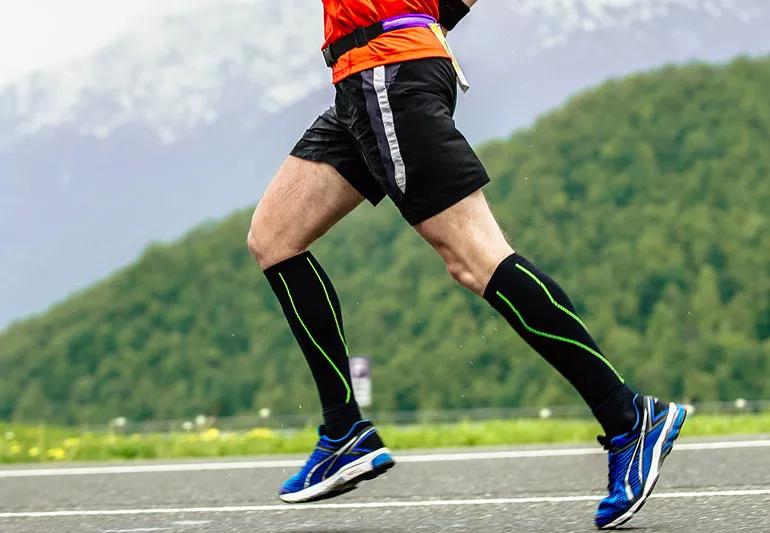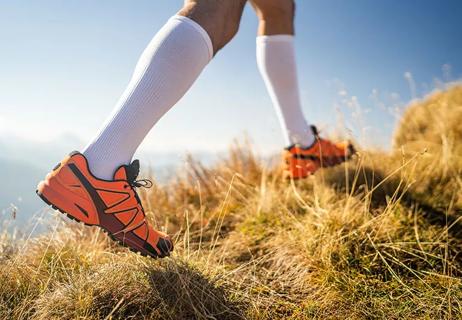Safe to wear for most people, compression socks promote better blood circulation in your legs

Chances are, you’ve probably seen compression socks before — specially made stockings that gently squeeze around legs at various lengths. But if you’ve never had to use them, there may be plenty you don’t know about them.
Advertisement
Cleveland Clinic is a non-profit academic medical center. Advertising on our site helps support our mission. We do not endorse non-Cleveland Clinic products or services. Policy
From their medical advantages to the misconception about age-appropriate use, there’s lots to learn about compression socks.
We turn to foot surgeon Georgeanne Botek, DPM, for everything you need to know.
Compression socks (or compression stockings) are socks of various length and tightness that are designed to gently squeeze legs a bit more than typical socks.
“The key intention is to promote better blood circulation in the legs,” explains Dr. Botek. “It’s a very practical and common thing. But at the same time, it’s a very underutilized option.”
In other words, more people could benefit from using them, particularly if you have swelling in your legs, insufficient veins or to aid with blood flow when you’re sitting for long periods of time. Even athletes may benefit from wearing them from time to time.
Compression socks work most notably to help with venous problems of the legs.
“Nearly 90% of leg disorders originate within the veins,” says Dr. Botek.
A common issue known as chronic venous insufficiency (CVI) occurs when the veins in your legs become damaged and the valves in your veins aren’t functioning well enough. When this happens, blood pools and causes swelling in your legs, increased pressure in your leg veins and insufficient blood flow to your heart. If blood pools in the veins of your legs, it can cause a variety of other issues, too, like:
Advertisement
Compression socks gently squeeze your legs to increase the pressure in the tissues beneath your skin. The result: Reduced swelling, swelling prevention and increased absorption of excess fluid. They also reduce the ability of superficial veins to expand in order to fill with blood, which prevents that blood from flowing backward and causing congestion.
Besides venous insufficiency, Dr. Botek says that another common reason for wearing compression socks is to aid in blood flow when you’re sitting for long periods of time, like on a long flight. With less movement and weaker circulation, there’s more pooling and retention of blood in the legs, which can raise chances of clots.
While the threat of clots isn’t that high if you’re healthy, you’ve probably noticed discomfort or swelling still taking place on long flights. Compression socks help keep that circulation going and reduces those symptoms.
Compression socks help by:
Compression socks are safe to wear by most people. But if you have severe peripheral artery disease (a condition where you have reduced blood flow in your legs), you shouldn’t wear compression socks. And while it’s OK to wear compression socks for several hours, you shouldn’t sleep in compression socks either, as they won’t be as effective — plus, you should give your legs time to rest.
It’s not uncommon to see athletes in various sports wear different types of compression socks or even compression sleeves. According to Dr. Botek, while there’s not a lot of evidence to support the direct cause for how they positively benefit athletes, there has been some evidence that compression wear can help recovery.
“There was an Australian study that looked at runners and found that compression socks could possibly have a positive impact on subsequent running performance,” he notes. In other words, if you wear compression socks for a run, you might have a better run the next time you hit the pavement.
There have been theories about the effects they have for a runner’s circulation — increasing oxygen delivery to muscles, improving blood circulation, speeding the removal of lactic acid — but Dr. Botek says we don’t really know yet if that’s the case.
Advertisement
“It can be about personal preference, too,” he continues. “People might wear them because they feel good, and everyone wants that little competitive advantage.”
You’ll generally find two types of compression socks: graduated and anti-embolism stockings. As always, be sure to check with a healthcare provider first with any questions may you have.
Graduated compression socks are the more common types you’ll find and what most people use. While available in a range of compression tightness, these socks are all tightest around the ankle, getting looser the higher up the leg they go. Compression socks generally come in two lengths — knee-high and thigh-high — but full compression tights are growing more common with athletes.
Anti-embolism stockings are more specific in purpose. They’re designed to help maintain circulation, thus preventing blood clots, particularly for anyone confined to a bed after surgery.
Most compression socks you’ll find on store shelves — be it a sporting goods store or drugstore — are going to be of light to medium compression, but you may want to reconsider getting an over-the-counter version or purchasing compression socks online.
Companies don’t have any regulations on how much compression their products provide. So, while you may find a product contains descriptions like “mild,” “moderate” and “heavy compression,” there’s no way of telling just how much compression you’ll get unless you purchase medical grade compression socks or prescribed stockings.
Advertisement
And if it’s your first time wearing compression socks, but you find them uncomfortable as you wear them throughout the day, it’s OK to take them off.
“Don’t feel you have to wear them from breakfast to dinner,” reassures Dr. Botek. “Sometimes, you need to adjust to them if you find them uncomfortable, like when you break in a new pair of shoes.”
You may also want to consider whether you prefer below- or above-the-knee socks.
“If you have thicker calf muscles, I would say go with the above-knee compression socks,” advises Dr. Botek. “Sometimes, that extra few inches of material can create more comfort at the top of your calf, so it’s not necessarily tight on your skin there.”
But remember: Taking care of your legs and overall health takes much more than pulling on a pair of socks and calling it a day.
“Compression socks are just one part of your regimen. Make sure you’re drinking plenty of water, consuming a low-salt diet and moving your legs,” states Dr. Botek. “Just sitting for long periods of time or just standing for long periods of time can cause swelling in your legs. Try to find that happy balance between the two, keeping your muscles working and not just succumbing to gravity.”
Advertisement

Sign up for our Health Essentials emails for expert guidance on nutrition, fitness, sleep, skin care and more.
Learn more about our editorial process.
Advertisement

Find out if you can benefit from a 24/7 squeeze.

At-home treatments and lifestyle changes may help ease the symptoms and improve the appearance of varicose veins — but they aren’t a cure

Try seated and standing exercises to help lengthen and strengthen the muscles that support your plantar fascia

Keep your tootsies clean, moisturized and consider wearing socks at night

Spoiler alert: Science doesn’t back the numerous health claims

Some things you find in your house have antifungal properties — but that doesn’t mean they’ll clear your toenail fungus

Home remedies are unlikely to cure your contagious foot fungus — and they might even make it worse

Cramps can creep up if your shoes are too tight, you’re dehydrated or you have poor circulation

Even small moments of time outdoors can help reduce stress, boost mood and restore a sense of calm

A correct prescription helps your eyes see clearly — but as natural changes occur, you may need stronger or different eyeglasses

Both are medical emergencies, but they are very distinct events with different causes